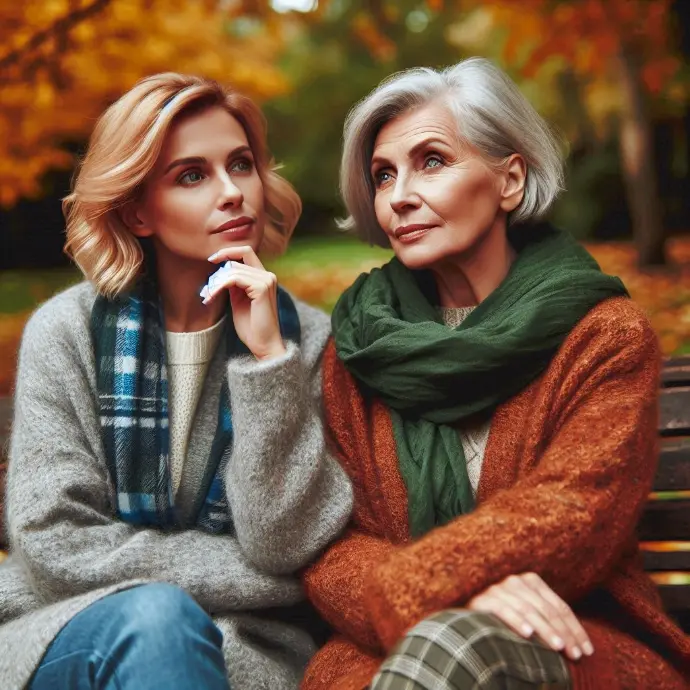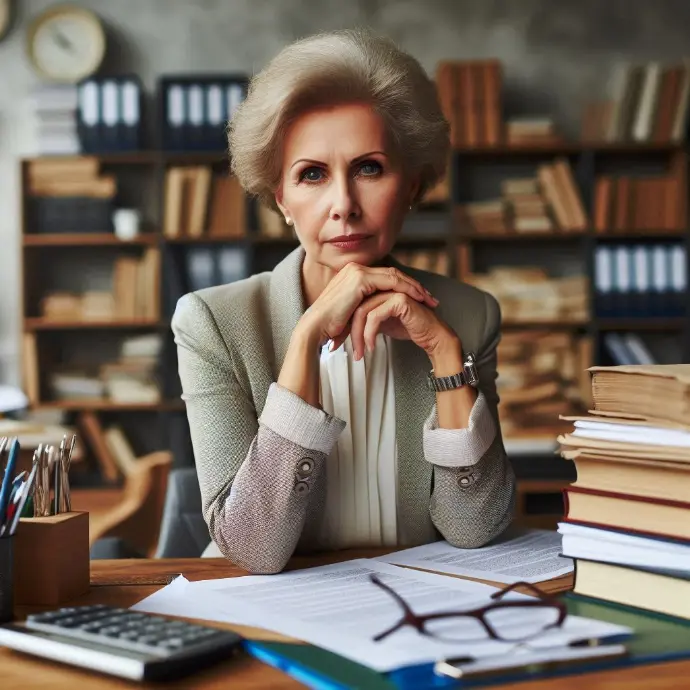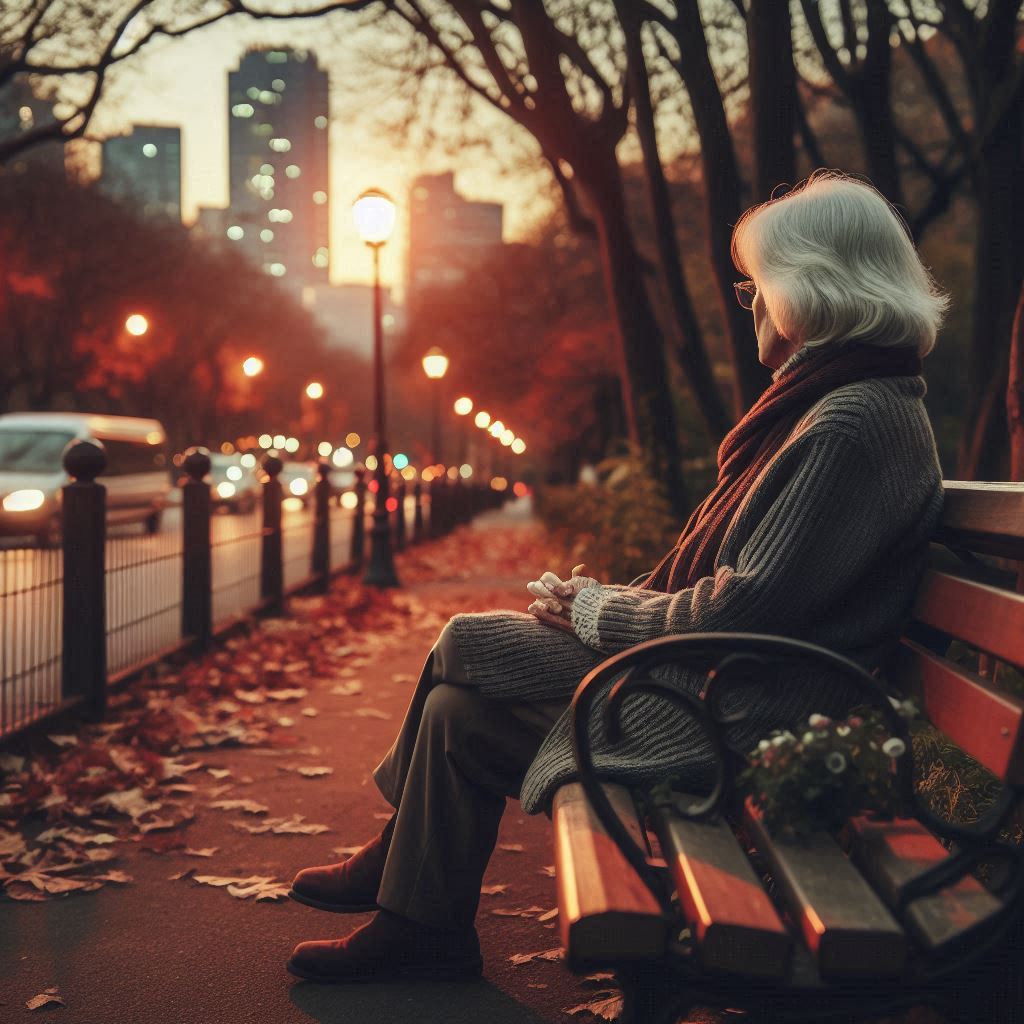Older Women:
Challenges and Discrimination
in Old Age
In our article, "Older Women: Challenges and Discrimination in Old Age," we take an in-depth look at the discrimination women face as they age in the area of human rights. Ready to delve deeper into this important topic? Read on to discover how, together, we can work to create a more just world for all older women!
Introduction
Addressing discrimination in old age is critical to ensuring equal rights and opportunities for all people, regardless of age and gender. For older women, this discrimination can be even more pronounced, as they are influenced by entrenched gender stereotypes and face unique challenges related to their age and gender.
Discrimination in old age can manifest itself in a variety of ways, including limited access to healthcare, social exclusion, lack of employment opportunities, and lack of participation in decision-making. These issues directly affect older women's quality of life and undermine their ability to fully enjoy their human rights.
Therefore, combating discrimination in old age is critical to creating inclusive and equitable societies in which all people, regardless of age, gender, or any other characteristic, can live full and dignified lives.
The situation of women in old age presents significant challenges stemming from the intersection of gender and age discrimination. According to data from the World Health Organization, women tend to live longer than men, meaning they represent a larger proportion of the older population. Despite this, they face inequalities in various aspects of life.
In many cases, older women have experienced wage disparities throughout their working lives, which can result in lower pensions and greater economic insecurity in old age. Furthermore, the disproportionate burden of unpaid care that falls on women throughout their lives can intensify in old age, affecting their physical, emotional, and social well-being.
Lack of political representation and invisibility in the media also contribute to the marginalization of older women, which in turn influences their access to adequate resources and services. These combined factors create a complex landscape that requires specific attention to address the needs and challenges of older women.
Discrimination in old age has a significant impact on the human rights of older women. Limited access to quality healthcare and social support services, coupled with exclusion from public life, undermines their right to health, social participation, and equal opportunities.
Furthermore, discrimination in old age can exacerbate older women's vulnerability to gender-based violence and abuse, jeopardizing their right to live free from violence and discrimination. The lack of support networks and effective reporting mechanisms can leave many older women in highly vulnerable situations, without access to adequate justice and protection.
In this regard, it is crucial to address discrimination in old age as a central issue within the human rights agenda, recognizing the specific experiences and needs of older women and working to eliminate the barriers that hinder their full enjoyment of fundamental human rights.

Discrimination Against Women in Older Age
Discrimination against older women manifests itself in various forms, from social exclusion to lack of access to adequate health services. Older women often face obstacles to participating in public life, are affected by social invisibility, and are more likely to suffer abuse and mistreatment. These forms of discrimination are intertwined with other factors, such as economic status and belonging to minority groups, which exacerbate these women's vulnerability.
Furthermore, discrimination against older women is reflected in the lack of recognition of their rights, unequal access to employment opportunities, and limited decision-making that affects their daily lives. These manifestations of discrimination contribute to the vulnerability of older women, impacting their physical, emotional, and social well-being. It is important to emphasize that discrimination against older women not only affects their quality of life but also represents a violation of their fundamental human rights, underscoring the urgency of addressing this problem comprehensively.
According to the UN, approximately 60% of older people living in poverty are women, highlighting the economic inequality they face compared to men in the same situation. Furthermore, a World Health Organization report indicates that older women have less access to healthcare, which directly impacts their well-being and quality of life.
Regarding violence, a WHO study indicates that approximately 15% of older women have experienced some form of abuse, whether physical, psychological, or sexual. These figures reflect the magnitude of the problem and the need to implement effective measures to prevent and address discrimination against women in old age.
Furthermore, statistics reveal that older women have less access to pensions and social security compared to men, which contributes to their greater economic and social vulnerability.
Discrimination against women in old age is influenced by various socioeconomic and cultural factors that perpetuate gender inequality throughout the lifespan. Wage gaps and job segregation during the productive stage directly impact the economic situation of older women, who are often forced to depend on others to meet their basic needs.
Likewise, cultural norms and gender stereotypes contribute to discrimination against women in old age, limiting their participation in society and reinforcing traditional roles that perpetuate inequality. The lack of representation of older women in decision-making spaces and the absence of specific public policies also influence the persistence of discrimination.
Discrimination against women in old age is the result of the intersection of social, economic, and cultural factors that affect their well-being and fundamental rights. Addressing this issue requires a comprehensive approach that recognizes the different dimensions of discrimination and promotes gender equality throughout the lifespan.
Discrimination experienced by older women can have serious psychological and emotional consequences. Social rejection, exclusion, and unfair treatment due to age and gender can lead to feelings of loneliness, anxiety, and depression. Older women who face discrimination may also experience a decline in their self-esteem and self-worth, which affects their mental and emotional well-being.
Furthermore, discrimination in old age can negatively impact the psychological health of older women, increasing their risk of developing mental disorders such as post-traumatic stress disorder, chronic anxiety, and depression. These emotional consequences can have a detrimental effect on older women's quality of life, limiting their participation in society and affecting their enjoyment of life in later life.
Discrimination in old age not only affects the psychological well-being of older women but can also impact their physical health. The emotional stress caused by discrimination can contribute to the development of chronic diseases, underscoring the importance of addressing discrimination in old age as a matter of human rights and holistic well-being.

Legal and Social Challenges
Currently, the analysis of the human rights of older women has become a topic of great relevance globally. As the population ages, the need for a comprehensive exploration of the rights of women in later life has become evident. This in-depth analysis seeks to identify the challenges and obstacles older women face in different aspects of their lives, from access to healthcare to participation in decision-making in society.
Age and gender discrimination remains a major concern in many countries, highlighting the importance of a detailed examination of the situation of older women in the context of human rights. This analysis seeks not only to identify current problems but also to propose effective solutions to guarantee equal rights for women in later life. It is essential to address this issue from an intersectional perspective, considering that older women may face discrimination not only because of their age, but also because of their gender, socioeconomic status, and ethnic origin, among other factors. This comprehensive approach is essential to understanding the complexity of the challenges older women face today.
Regarding current legislation and policies to address discrimination in older age, it is crucial to assess their effectiveness and applicability in the context of older women's rights. Despite advances in human rights, a significant gap remains between theory and practice regarding the protection of older women's rights.
A detailed analysis of existing laws and policies is necessary to identify potential gaps or deficiencies that may be contributing to systemic discrimination against older women. Furthermore, special attention should be paid to the effective implementation of these regulations, as well as to enforcement and monitoring mechanisms that ensure their compliance in practice.
Likewise, it is essential to promote the adoption of new laws and policies that specifically address the needs and concerns of older women, comprehensively recognizing their rights and providing effective protection against any form of discrimination based on age and gender.
The roles of society and institutions in protecting the rights of older women are fundamental to ensuring a safe and respectful environment for this segment of the population. Awareness-raising and education about the specific challenges faced by older women are key to fostering positive change in society.
Institutions, both governmental and civil society, play a crucial role in promoting and protecting the rights of older women. This includes implementing specialized programs and services, as well as establishing reporting and support mechanisms for women who experience discrimination or abuse in any area of their lives.
The creation of support and solidarity networks among older women themselves is also a fundamental aspect that can significantly contribute to the protection of their rights. The empowerment and active participation of older women in decision-making and policymaking are essential elements to ensure that their needs are met and their rights respected in all aspects of life.
Promoting equality and inclusion in old age is essential to ensure that older women enjoy their human rights on an equal basis. One effective strategy is to encourage the active participation of older women in decision-making at the community and government levels. This can be achieved by creating safe spaces where older women can express their needs and concerns, as well as participate in the formulation of policies that directly affect their well-being.
Another important strategy is the implementation of training and education programs specifically targeted at older women, with the aim of empowering them and providing them with the necessary tools to exercise their rights. These programs can range from digital literacy to job skills training, enabling them to access employment or entrepreneurship opportunities, thereby reducing their economic and social vulnerability.
The implementation of these strategies can play a crucial role in promoting equality and inclusion for older women within the human rights framework.
Impact on health and well-being
Discrimination experienced by older women has a significant impact on their physical and mental health. Lack of access to adequate opportunities, resources, and services can lead to chronic stress, anxiety, and depression. These factors, combined with perceived discrimination in social and healthcare settings, can lead to chronic health problems, such as hypertension, diabetes, and sleep disorders.
Discrimination can also contribute to feelings of isolation and loneliness in older women, which in turn can negatively affect their emotional well-being. Recognizing and addressing these impacts is critical to promoting equality and adequate care for older women in society.
It is crucial to implement mental health programs specific to older women that address the unique challenges they face due to discrimination and the stigma associated with aging.
Limited access to quality healthcare and support services is a major concern for older women who face discrimination. Economic, geographic, and cultural barriers can hinder their ability to receive preventive health care, timely diagnosis, and appropriate treatment.
Furthermore, many older women face obstacles in accessing support services, such as long-term care, legal counseling, and wellness programs. Gender and age discrimination can impact the availability and quality of these services, leaving many older women vulnerable.
It is critical to advocate for inclusive and accessible health care systems that recognize the specific needs of older women. Likewise, community support programs should be developed that promote social inclusion and the comprehensive well-being of this population.
Empowerment and promoting strong self-esteem are critical to countering the effects of discrimination on older women. Providing them with opportunities to participate in decision-making, access continuing education, and obtain training in new skills can strengthen their confidence and autonomy.
Furthermore, it is essential to foster environments that value the experience and wisdom of older women, thereby countering the negative stereotypes associated with female aging. Strengthening self-esteem can help older women confront discrimination with resilience and defend their rights with determination.
Promoting mentoring programs, support groups, and intergenerational activities can help empower older women, allowing them to actively participate in society and promote positive change in the perception of female aging.

Empowerment and Empowerment
Older women around the world face multiple forms of discrimination, ranging from lack of access to healthcare to social exclusion. Despite these challenges, many older women have demonstrated remarkable resilience and strength. Their stories reflect a constant struggle for equality and recognition of their human rights, challenging gender stereotypes and overcoming obstacles to live full and meaningful lives in later life.
These experiences of older women defying discrimination are inspiring examples of courage and determination, and serve as a reminder of the importance of comprehensively addressing the needs and concerns of older women within the context of human rights.
Listening to and sharing these stories is essential to making the realities of older women visible and promoting dignified aging free from discrimination.
Globally, various organizations and programs are dedicated to promoting the empowerment of women in old age, recognizing the importance of ensuring equal rights and opportunities for all people, regardless of age or gender.
These initiatives address fundamental issues such as access to education, participation in decision-making, access to healthcare, and protection from gender-based violence. Through training, support networks, and awareness-raising campaigns, these organizations work to empower older women and provide them with the necessary tools to confront discrimination and social exclusion.
By highlighting the work of these organizations and programs, we seek to raise awareness about the importance of creating inclusive and equitable environments for older women, recognizing their invaluable contribution to society and ensuring the full exercise of their human rights.
Promoting dignified aging free from discrimination for women involves addressing complex challenges ranging from health issues to social and economic barriers. To achieve this goal, it is essential to implement policies and measures that recognize and respond to the specific needs of older women.
Key recommendations include promoting the active participation of older women in decision-making, fostering friendly and accessible environments, ensuring comprehensive health services, and providing protection from violence and abuse. It is also crucial to challenge gender stereotypes and promote the inclusion of older women in all aspects of social, economic, and cultural life.
By adopting a comprehensive approach that recognizes the diversity of experiences and needs of older women, we can move toward a future where aging is a dignified and enriching life stage, free from discrimination and full of opportunities for all, regardless of gender or age.

Conclusions
Today, there are significant challenges facing women as they age, including discrimination and lack of access to resources and opportunities. Understanding and addressing these issues is critical to ensuring dignified and equitable aging for all women.
Collective action plays a crucial role in promoting and protecting the rights of older women. Through collaboration and mutual empowerment, it is possible to advocate for significant changes in policies and practices affecting women in later life. It is essential that communities, organizations, and governments work together to effectively address these outstanding challenges.
Human rights advocacy plays a critical role in combating discrimination in old age. By ensuring that the fundamental rights of older women are respected and protected, we can move toward a future where age and gender discrimination are a thing of the past. It is crucial that human rights advocates actively engage in promoting equality and justice for all women, regardless of age.

 IHRO NEWS
IHRO NEWS